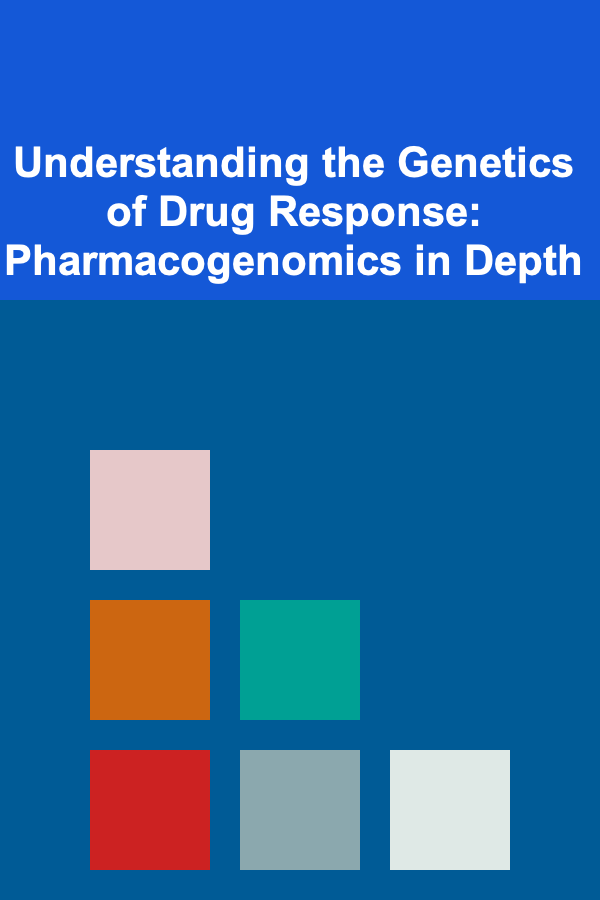
Understanding the Genetics of Drug Response: Pharmacogenomics in Depth
ebook include PDF & Audio bundle (Micro Guide)
$12.99$9.99
Limited Time Offer! Order within the next:

The field of pharmacogenomics, the study of how genes affect a person's response to drugs, has revolutionized modern medicine. No longer can we assume a one-size-fits-all approach to medication. Understanding the genetic variations that influence drug metabolism, transport, and target interaction is crucial for optimizing therapeutic efficacy and minimizing adverse drug reactions (ADRs). This comprehensive exploration delves into the intricacies of pharmacogenomics, covering the underlying genetic mechanisms, clinical implications, ethical considerations, and future directions of this rapidly evolving discipline.
Introduction to Pharmacogenomics
Pharmacogenomics seeks to explain the interindividual variability in drug response that is attributable to genetic factors. Historically, drug dosing was largely determined empirically, based on factors like age, weight, and sex. However, it became increasingly apparent that individuals respond differently to the same drug, even after accounting for these standard variables. This unexplained variability pointed towards a deeper, more intrinsic source of influence: our genes.
The foundation of pharmacogenomics lies in the understanding that genes encode proteins, and these proteins play critical roles in various aspects of drug disposition and action. Key areas influenced by genetics include:
- Pharmacokinetics (PK): How the body processes a drug, including absorption, distribution, metabolism, and excretion (ADME).
- Pharmacodynamics (PD): How the drug affects the body, including its interaction with target receptors, downstream signaling pathways, and overall therapeutic effect.
Genetic variations, also known as polymorphisms, within genes encoding proteins involved in these processes can significantly alter drug response. These variations can range from single nucleotide polymorphisms (SNPs), which are single base-pair changes, to larger structural variations like insertions, deletions, and copy number variations (CNVs). The resulting altered protein function can lead to increased or decreased drug metabolism, altered receptor binding affinity, or modified signaling pathways, ultimately impacting the drug's effectiveness and potential for toxicity.
Key Genes and Pathways in Pharmacogenomics
Several gene families and specific genes have been extensively studied in the context of pharmacogenomics. These genes often encode enzymes, transporters, receptors, and other proteins crucial for drug disposition and action. Understanding the function and common polymorphisms of these genes is essential for interpreting pharmacogenomic test results and guiding personalized drug therapy.
Cytochrome P450 Enzymes (CYPs)
The cytochrome P450 (CYP) superfamily is a group of enzymes primarily responsible for phase I metabolism of drugs and xenobiotics. Located mainly in the liver, these enzymes catalyze oxidation, reduction, and hydrolysis reactions, often converting drugs into more polar metabolites that are easier to excrete. Polymorphisms in CYP genes are among the most well-studied and clinically relevant in pharmacogenomics. Significant variations exist between individuals in the activity of these enzymes, leading to different metabolic rates.
Examples of important CYP enzymes in pharmacogenomics include:
- CYP2D6: Metabolizes approximately 25% of commonly prescribed drugs, including antidepressants (e.g., paroxetine, fluoxetine), opioids (e.g., codeine, tramadol), and beta-blockers (e.g., metoprolol). Individuals can be classified as poor metabolizers (PMs), intermediate metabolizers (IMs), extensive metabolizers (EMs), or ultra-rapid metabolizers (UMs) based on their CYP2D6 genotype. UMs may experience reduced drug efficacy due to rapid drug breakdown, while PMs are at higher risk of ADRs due to drug accumulation. Codeine, for example, is a prodrug that requires CYP2D6 to be converted into its active form, morphine. PMs may not experience adequate pain relief, while UMs may experience morphine toxicity even at standard doses.
- CYP2C19: Metabolizes drugs such as proton pump inhibitors (PPIs) (e.g., omeprazole, lansoprazole), antiplatelet agents (e.g., clopidogrel), and antidepressants (e.g., citalopram). Similar to CYP2D6, individuals can be classified as PMs, IMs, EMs, or UMs. Clopidogrel, another prodrug, requires CYP2C19 for activation. PMs of CYP2C19 may have reduced antiplatelet effects and increased risk of cardiovascular events when taking clopidogrel.
- CYP2C9: Metabolizes drugs such as warfarin (an anticoagulant) and phenytoin (an anticonvulsant). Variations in CYP2C9 can affect the required warfarin dose to achieve therapeutic anticoagulation. PMs require lower doses to avoid bleeding complications, while EMs may require higher doses.
- CYP3A4/5: The most abundant CYP enzymes in the liver, responsible for metabolizing a wide range of drugs, including statins, immunosuppressants, and calcium channel blockers. While CYP3A4 is highly expressed in most individuals, CYP3A5 expression varies significantly based on genetic polymorphisms. Individuals with the CYP3A5*3 allele, a common variant, have reduced CYP3A5 expression, leading to altered drug metabolism.
Drug Transporters
Drug transporters are proteins that facilitate the movement of drugs across cell membranes, affecting drug absorption, distribution, and excretion. Polymorphisms in genes encoding drug transporters can significantly alter drug exposure and response.
- ABCB1 (MDR1/P-glycoprotein): Encodes P-glycoprotein, an efflux transporter that pumps drugs out of cells, limiting their absorption and increasing their excretion. Polymorphisms in ABCB1 can affect the bioavailability of drugs transported by P-glycoprotein, such as digoxin, immunosuppressants, and certain chemotherapy agents.
- SLCO1B1 (OATP1B1): Encodes OATP1B1, an influx transporter that facilitates the uptake of drugs into hepatocytes (liver cells). Polymorphisms in SLCO1B1 are strongly associated with statin-induced myopathy (muscle pain and weakness). Individuals with certain SLCO1B1 variants have reduced OATP1B1 function, leading to increased plasma statin concentrations and higher risk of muscle toxicity.
Drug Targets
Genetic variations in drug targets, such as receptors and enzymes, can also affect drug response. These variations can alter the affinity of the drug for its target, the downstream signaling pathways, or the overall therapeutic effect.
- VKORC1: Encodes vitamin K epoxide reductase complex subunit 1, the target of warfarin. Polymorphisms in VKORC1 are a major determinant of warfarin dose requirements. Individuals with certain VKORC1 variants are more sensitive to warfarin and require lower doses.
- TPMT: Encodes thiopurine methyltransferase, an enzyme that metabolizes thiopurine drugs like azathioprine and 6-mercaptopurine, used in the treatment of autoimmune diseases and leukemia. Individuals with TPMT deficiency are at high risk of severe myelosuppression (bone marrow suppression) when treated with standard doses of these drugs. TPMT genotyping is recommended before initiating thiopurine therapy to identify individuals who require dose reduction or alternative treatment.
- DPYD: Encodes dihydropyrimidine dehydrogenase, an enzyme that metabolizes fluoropyrimidine chemotherapy drugs like 5-fluorouracil (5-FU). DPYD deficiency increases the risk of severe toxicity, including myelosuppression, mucositis (inflammation of the mucous membranes), and neurotoxicity. DPYD genotyping is increasingly recommended before initiating 5-FU therapy.
Pharmacogenomic Testing and Interpretation
Pharmacogenomic testing involves analyzing an individual's DNA to identify genetic variations that may affect drug response. Several methods are used for pharmacogenomic testing, including:
- Single Nucleotide Polymorphism (SNP) Genotyping: Detects specific SNPs in target genes using techniques such as microarray analysis and polymerase chain reaction (PCR).
- Next-Generation Sequencing (NGS): Sequences entire genes or targeted regions of the genome to identify a wider range of genetic variations, including SNPs, insertions, deletions, and copy number variations.
- Real-Time PCR: Quantifies the expression level of specific genes, providing insights into gene activity and potential functional consequences of genetic variations.
Interpreting pharmacogenomic test results requires a thorough understanding of the genes and polymorphisms being analyzed, the drugs affected, and the available clinical guidelines. Several resources can aid in the interpretation of pharmacogenomic test results, including:
- Clinical Pharmacogenetics Implementation Consortium (CPIC): Provides evidence-based guidelines for translating pharmacogenomic test results into actionable prescribing recommendations. CPIC guidelines are regularly updated as new evidence emerges.
- Dutch Pharmacogenetics Working Group (DPWG): Develops pharmacogenomic dosing recommendations based on Dutch population data and clinical practice.
- PharmGKB (Pharmacogenomics Knowledgebase): A comprehensive resource that curates and integrates pharmacogenomic knowledge, including gene-drug associations, variant annotations, and clinical guidelines.
Pharmacogenomic test results are typically reported as genotypes, which represent the specific alleles an individual carries for a particular gene. These genotypes are then translated into predicted phenotypes, which describe the individual's expected functional status (e.g., poor metabolizer, extensive metabolizer). The predicted phenotype is used to guide drug selection and dosing.
It's important to note that pharmacogenomic testing is not a standalone diagnostic tool. Clinical context, including patient history, other medications, and disease state, should always be considered when interpreting pharmacogenomic test results. Furthermore, environmental factors and non-genetic influences can also contribute to drug response variability.
Clinical Applications of Pharmacogenomics
Pharmacogenomics has numerous clinical applications across various medical specialties, including:
- Psychiatry: Guiding the selection and dosing of antidepressants and antipsychotics. CYP2D6 and CYP2C19 genotyping can help optimize treatment for patients with depression and anxiety.
- Cardiology: Personalizing antiplatelet therapy with clopidogrel based on CYP2C19 genotype and warfarin dosing based on CYP2C9 and VKORC1 genotypes. SLCO1B1 genotyping can help identify patients at increased risk of statin-induced myopathy.
- Oncology: Optimizing chemotherapy regimens based on TPMT and DPYD genotypes to minimize toxicity and improve efficacy. Pharmacogenomics can also guide the use of targeted therapies based on specific gene mutations in cancer cells.
- Pain Management: Tailoring opioid therapy based on CYP2D6 genotype to ensure adequate pain relief and minimize the risk of adverse effects.
- Transplantation: Adjusting the dose of immunosuppressants based on CYP3A5 genotype to prevent graft rejection and toxicity.
The integration of pharmacogenomics into clinical practice is gradually increasing. Several hospitals and healthcare systems have implemented pharmacogenomic testing programs to provide personalized medication management services.
Challenges and Future Directions
Despite the significant advances in pharmacogenomics, several challenges remain:
- Limited Evidence Base for Some Gene-Drug Pairs: For many gene-drug pairs, the clinical evidence supporting pharmacogenomic-guided prescribing is still limited. More robust clinical trials are needed to demonstrate the benefits of pharmacogenomic testing for a wider range of drugs and patient populations.
- Complexity of Gene-Gene and Gene-Environment Interactions: Drug response is influenced by complex interactions between multiple genes and environmental factors. Understanding these interactions is crucial for developing more accurate and comprehensive pharmacogenomic models.
- Lack of Standardization and Harmonization of Testing Methods and Guidelines: Variability in testing methods and inconsistent interpretation guidelines can lead to inconsistent results and challenges in implementing pharmacogenomics across different healthcare settings.
- Cost and Accessibility: The cost of pharmacogenomic testing can be a barrier to access, particularly in resource-limited settings. Efforts are needed to reduce the cost of testing and improve its accessibility to all patients who could benefit.
- Education and Training: Healthcare providers need adequate education and training in pharmacogenomics to effectively interpret test results and apply them to clinical practice.
- Ethical, Legal, and Social Implications (ELSI): Concerns surrounding data privacy, genetic discrimination, and equitable access to pharmacogenomic testing must be addressed.
Future directions in pharmacogenomics include:
- Expanding the Scope of Pharmacogenomic Testing: Moving beyond single-gene testing to multi-gene panels and whole-genome sequencing to capture a more comprehensive picture of an individual's genetic predisposition to drug response.
- Developing More Sophisticated Pharmacogenomic Models: Integrating genetic data with other clinical and environmental factors to create more accurate and personalized drug dosing algorithms. This includes using machine learning and artificial intelligence to analyze large datasets and identify complex relationships.
- Implementing Preemptive Pharmacogenomic Testing: Performing pharmacogenomic testing before drug initiation to proactively identify individuals at risk of adverse drug reactions or reduced drug efficacy. This approach can enable clinicians to make more informed prescribing decisions from the outset.
- Integrating Pharmacogenomics into Electronic Health Records (EHRs): Developing clinical decision support systems within EHRs to automatically alert providers to potential gene-drug interactions and provide personalized dosing recommendations.
- Discovering Novel Pharmacogenomic Biomarkers: Identifying new genes and polymorphisms that influence drug response, expanding the repertoire of pharmacogenomic markers available for clinical use. This involves leveraging advancements in genomics, proteomics, and metabolomics technologies.
- Focus on Diverse Populations: Addressing the current bias towards European ancestry in pharmacogenomic research. Conducting studies in diverse populations is crucial for ensuring that pharmacogenomic testing is equitable and effective for all individuals.
Conclusion
Pharmacogenomics holds immense promise for transforming healthcare by enabling personalized drug therapy. By understanding the genetic basis of drug response, we can optimize treatment outcomes, minimize adverse drug reactions, and improve patient safety. While challenges remain, ongoing research and technological advancements are paving the way for wider adoption of pharmacogenomics in clinical practice. As the field continues to evolve, it will undoubtedly play an increasingly important role in shaping the future of medicine, leading to more effective and individualized healthcare for all.

How to Host a Home Party for Introverts and Extroverts Alike
Read More
How to Store Winter Clothes Without Taking Up Too Much Space
Read More
Smart Saving for Retirement Strategies to Maximize Your Nest Egg
Read More
Smart Ways to Get Affordable Auto Repairs and Keep Your Car Running Smoothly
Read More
The Comprehensive Guide to Graphic Design: Best Practices and Tools for a Successful Career as a Specialist
Read More
Growing Food in Space: A Deep Dive
Read MoreOther Products

How to Host a Home Party for Introverts and Extroverts Alike
Read More
How to Store Winter Clothes Without Taking Up Too Much Space
Read More
Smart Saving for Retirement Strategies to Maximize Your Nest Egg
Read More
Smart Ways to Get Affordable Auto Repairs and Keep Your Car Running Smoothly
Read More
The Comprehensive Guide to Graphic Design: Best Practices and Tools for a Successful Career as a Specialist
Read More